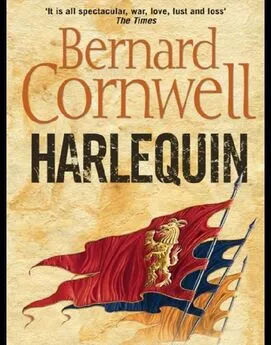Bernard Cornwell - The Grail Quest 2 - Vagabond
- Название:The Grail Quest 2 - Vagabond
- Автор:
- Жанр:
- Издательство:неизвестно
- Год:неизвестен
- ISBN:нет данных
- Рейтинг:
- Избранное:Добавить в избранное
-
Отзывы:
-
Ваша оценка:
Bernard Cornwell - The Grail Quest 2 - Vagabond краткое содержание
In Harlequin, Thomas of Hookton travelled to France as an archer and there discovered a shadowy destiny, which linked him to a family of heretical French lords who sought Christendom′s greatest relic.
Having survived the battle of Crécy, Thomas is sent back to England, charged with finding the Holy Grail. But Thomas is an archer and when a chance comes to fight against an army invading northern England he jumps at it. Plunged into the carnage of Neville′s Cross, he is oblivious to other enemies who want to destroy him. He discovers too late that he is not the only person pursuing the grail, and that his rivals will do anything to thwart him.
After hunting and wounding him, Thomas′s enemies turn him into a fugitive. Fleeing England, he travels to Normandy, determined to rescue Will Skeat, his old commander from Harlequin. Finally Thomas leads his enemies back to Brittany, where he goes to discover an old love and where his pursuers at last trap their reluctant pilgrim.
Vagabond is a vivid and realistic portrait of England at a time when the archer was king of Europe′s battlefields.
The Grail Quest 2 - Vagabond - читать онлайн бесплатно ознакомительный отрывок
Интервал:
Закладка:
'Nothing. The town is . . . what you say?' Sir Lodewijk made a circling motion with his hand.
'Surrounded.'
'Ja, the town is goddamn surrounded. By the English, ja? And by ...' He paused, uncertain of the word he wanted, then pointed to a stretch of waterlogged ground that lay east of the road. 'By that.'
'Marshes.'
'Ja! By bloody marshes. And the goddamn bloody French, they are on . . .' Again he was lost for words, so jabbed his mailed finger at the lowering sky.
'Higher ground?' Thomas guessed.
'Ja! Bloody high ground. Not so bloody high, I think, but higher. And they . . .' He put a hand over his eyes, as if shading them.
'Stare?'
'Ja! They stare at each other. So nothing is happens but they and we gets bloody wet. Pissing wet, ja?'
They got wet later that morning when the rains swept in from the ocean. Great curtains of grey lashed the deserted farmlands and upland heaths where the trees were permanently bent towards the east. When Thomas had first come to Brittany this had been a productive land of farms, orchards, mills and grazing, but now it was blasted naked. The fruit trees, untended, were thick with bullfinches, the fields were choked with weeds and the pastures tangled with couch grass. Here and there a few folk still tried to scratch a living, but they were constantly being forced to La Roche-Derrien to work on the ramparts and their harvests and livestock were forever being stolen by English patrols. If any such Bretons were aware of the fifteen horsemen they took care to hide themselves and so it seemed as though Thomas and his companions rode through a deserted country. They rode with one spare horse. They should have had more because only the three Flemings were mounted on good stallions. Sea voyages usually had a bad effect on horses, but Sir Lodewijk made it plain their journey had been unusually quick. 'Bloody winds, is?' He whirled his hand and made a whooshing noise to suggest the strength of the winds which had brought the destriers through in such fine fettle. 'Quick! Bloody quick!'
The Flemings were not only well mounted, but well equipped. Jan and Pieter had fine mail hauberks while Sir Lodewijk had his chest, both thighs and one arm protected by good plate that was strapped over a leather-backed mail haubergeon. The three wore black surcoats with a broad white stripe running down front and back, and all had undecorated shields, though Sir Lodewijk's horse's trapper displayed a badge showing a knife dripping blood. He tried to explain the device, but his English could not cope and Thomas was left with the vague impression that it was the mark of a trading guild in Bruges.
'The butchers?' he suggested to Robbie. 'Is that what he said? Butchers?'
'Bloody butchers don't make war. Except on pigs,' Robbie said. He was in a fine mood. Raiding was in his blood and he had heard stories in La Roche-Derrien's taverns of the plunder that could be stolen if a man was willing to break Richard Totesham's rule and ride further than a day's journey from the town. 'The trouble in the north of England,'
he told Thomas, 'is that if it's worth stealing then it's behind big bloody walls. We scratch up some cattle now and then, and a year ago I stole a fine horse off my Lord Percy, but there's not any gold and silver to be had. Nothing that you'd call real plunder. The Mass vessels are all wood or pewter or clay, and the poor boxes are poorer than the poor. And ride too far south and the bastards will be waiting for you on the way home. I hate bloody English archers.'
'I'm a bloody English archer.'
'You're different,' Robbie said, and he meant it for he was puzzled by Thomas. Most archers were country born, the sons of yeomen or smiths or bailiffs, while a few were the sons of labourers, but none in Robbie's experience was well born, which Thomas plainly was for he spoke French and Latin, he was confident in the company of lords and other archers deferred to him. Robbie might look like a wild Scottish fighter, but he was the son of a gentleman and nephew to the Knight of Liddesdale, and thus he regarded archers as inferior beings who, in a properly arranged universe, could be ridden down and slaughtered like game, but he liked Thomas. 'You're just bloody different,' he said. 'Mind you, when my ransom's paid and I'm safe home, I'll come back and kill you.'
Thomas laughed, but it was forced laughter. He was nervous. He put the nervousness down to being in the unfamiliar position of leading a raid. This was his idea, and it had been his promises that brought most of these men on the long ride. He had claimed that Roncelets, being so far from any English stronghold, lay in unplundered country. Snatch the child, he had promised them, and they could then pillage as much as they wished or at least until the enemy woke up and organized a pur-suit, and that promise had persuaded men to follow him and the responsibility of it weighed on Thomas. He also resented worrying. His ambition, after all, was to be the leader of a war band like Will Skeat had been before his injury, and what hope did he have of being a good leader if he fretted over a little raid like this? Yet fret he did, and he worried most of all that he might not have anticipated everything that could go wrong; and the men who had joined him gave him small consolation for, except for his friends and the newly arrived Flemings, they were the poorest and least well equipped of all the adventurers who had come to La Roche-Derrien in search of wealth. One of them, a quarrelsome man-at-arms from western Brittany, became drunk on the first day and Thomas discovered he had two water skins filled with a fierce apple spirit. He broke both skins, whereupon the enraged Breton drew his sword and attacked Thomas, but he was too drunk to see properly and a knee to his groin and a thump over the head put him down hard. Thomas took the man's horse and left him groaning in the mud, which meant he was down to fourteen men. 'That will have helped,' Sir Guillaume said cheerfully.
Thomas said nothing. He deserved to be mocked, he thought.
'No, I mean it! You knock a man down one day and you might do it again. You know why some men are bad leaders?'
'Why?'
'They want to be liked.'
'That's bad?' Thomas asked.
'Men want to admire their leaders, they want to fear them, and above all they want them to be successful. What does being liked have to do with any of that? If the leader is a good man he will be liked and if he's not, he won't, and if he is a good man and a bad leader then he is better off dead. You see? I am full of wisdom.' Sir Guillaume laughed. He might be down on his luck, his manor lost and fortune gone, but he was riding to a fight and that cheered him. 'The good thing about this rain,' he said, 'is that the enemy won't expect you to be riding in it. It's stay-at-home weather.'
'They'll know we've left La Roche-Derrien,' Thomas said. He was certain that Charles of Blois had as many spies in the town as the English had in Rennes.
'He won't know yet,' Sir Guillaume said. 'We're travelling faster than any message can go. Anyway, while they know we've left La Roche-Derrien, they don't know where we're going.'
They rode south in hope that the enemy would think they were planning to scavenge the farms near Guingamp, then late in the first day they turned eastwards and climbed into a high, empty country. The hazels were in blossom and rooks were calling from the bare elm tops, signs that the year was turning away from winter. They camped in a deserted farm, sheltered by low scorched stone walls, and before the last glimmer of dusk faded they had a good augury when Robbie, rooting about in the ruins of the barn, discovered a leather bag half buried beside the broken wall. The exorbitant rain had washed the earth away above the bag which held a small silver plate and three handfuls of coins. Whoever had buried the money must have thought the coins too heavy to carry or else had feared being robbed during their exile from the house.
'We, how do you say?' Sir Lodewijk made a chopping motion with his hand as if he cut up a pie.
'Share?'
'Ja! We share?'
'No,' Thomas said. That had not been the agreement. He would have preferred to have shared, for that was how Will Skeat had treated spoils, but the men who rode with him wanted to keep whatever they found.
Sir Lodewijk bridled. 'It is how we do it, ja? We share.'
'We don't share,' Sir Guillaume said harshly, 'it's been agreed.' He spoke in French and Sir Lodewijk reacted as though he had been struck, but he understood well enough and just turned and walked away.
'Tell your Scottish friend to watch his back,' Sir Guillaume said to Thomas.
'Lodewijk's not so bad,' Thomas said, 'you just don't like him because he's Flemish.'
'I hate the Flemish,' Sir Guillaume agreed, 'they're dull, stupid porkwits. Like the English.'
The small argument with the Flemings did not fester. Next morning Sir Lodewijk and his companions were cheerful and, because their horses were much fresher and fitter than any others, they volunteered, with much broken English and elaborate hand signals, to ride ahead as scouts and all day their black and white surcoats appeared and reappeared far ahead and each time they waved the main party on, signalling that there was no danger. The deeper they went into enemy territory the greater the risk, but the Flemings'
watchfulness meant that they made good progress. They were weaving a path either side of the main highway that ran east and west along Brittany's spine, a road flanked by deep woods, which hid the raiders from the few people who travelled on the road. They saw only two drovers with their skinny cattle and a priest leading a band of pilgrims who walked barefoot, waved tattered branches and sang a dirge. No pickings there. Next day they went south again. They were now entering a country where the farms had escaped English raiders and so the people were unafraid of horsemen and the pastures were filled with ewes and their new-born lambs, many of which had been torn to bloody scraps because the men of Brittany were too busy hunt-ing each other and so the foxes thrived and the lambs died. Shepherds' dogs barked at the grey-mailed men, and now Thomas no longer had the Flemings ride ahead, but instead he and Sir Guillaume led the horse-men and, if challenged, they answered in French, claiming to be supporters of Charles of Blois. 'Where's Roncelets?' they constantly asked and at first found no one who knew, but as the morning wore on they dis-covered a man who had at least heard of the place, then another who said his father had once been there and he thought it was beyond the ridge, the forest and the river, and then a third who gave them precise directions. The tower, he said, was no more than a half-day's journey away at the far end of a long wooded ridge that ran between two rivers. He showed them where to ford the nearer river, told them to follow the ridge crest southwards and then bowed his head in thanks for the coin Thomas gave him.
They crossed the river, climbed the ridge and rode south. Thomas knew they must be close to Roncelets when they stopped for the third night, but he did not press on for he reckoned it would be better to come to the tower in the dawn and so they camped under beech trees, shivering because they dared not light a fire, and Thomas slept badly because he was listening to the strange things crackle and rustle deep in the woods and he feared those noises might be made by patrols sent out by the Lord of Roncelets. Yet no patrols found them. Thomas doubted there were any patrols except in his imagination, yet still he could not sleep and so, very early, while the others snored, he blundered through the trees to where the ridge's flank fell steeply away and he stared into the night in hope of seeing a glimmer of light cast from the battlements of the Tower of Roncelets. He saw nothing, but he heard sheep bleating piteously further down the slope and he guessed that a fox had got among the lambs and was slaughtering them.
Читать дальшеИнтервал:
Закладка:





![Робин Хобб - Странствия Шута [Fool’s Quest]](/books/1086209/robin-hobb-stranstviya-shuta-fool-s-quest.webp)

